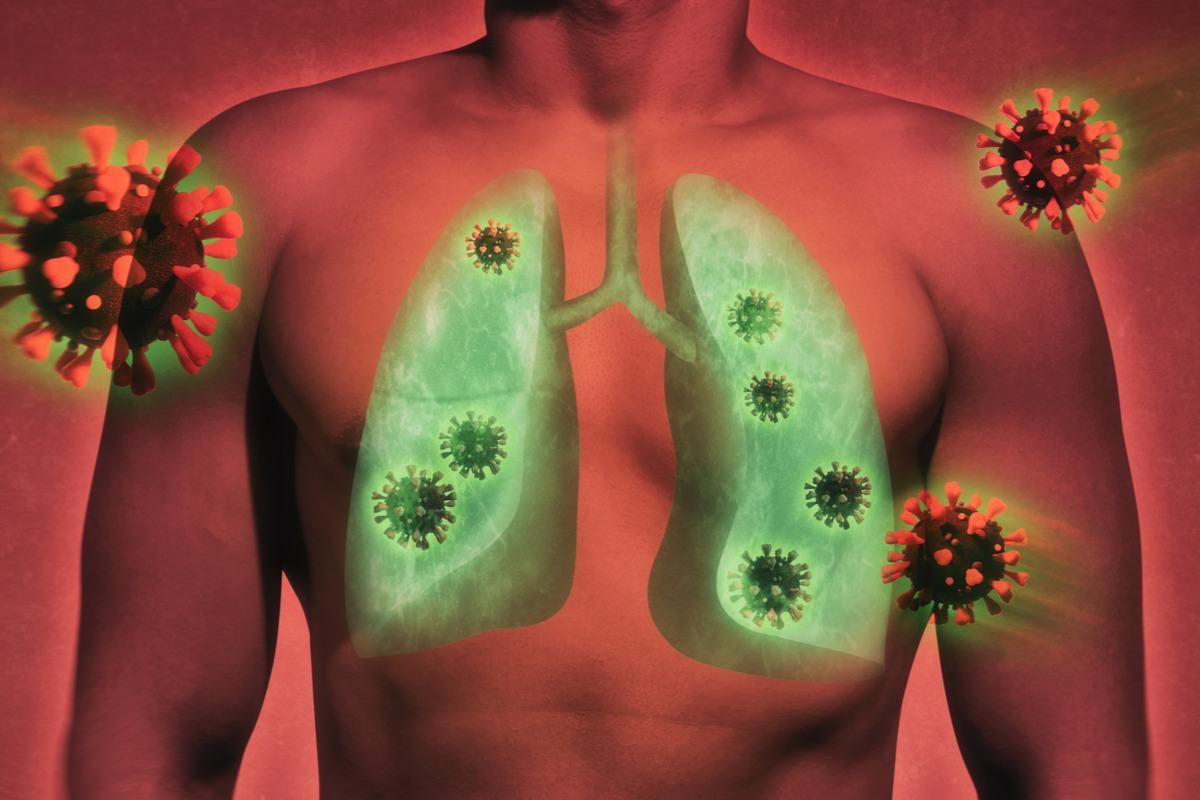Coronavirus disease 2019 (COVID-19) causes symptoms such as anosmia, coughing, headaches to more deadly results such as organ failure and lung damage. Recently, 'long-COVID' has come to the media's attention and has, as a result, gained significant attention. Long-COVID is seen in patients who have suffered from infection with severe acute respiratory syndrome coronavirus 2 (SARS-CoV-2), recovered enough to test negative for the virus on both PCR and rapid antigen testing, but continue to suffer from symptoms for a significant time after.
 Study: The Investigation of Pulmonary Abnormalities using Hyperpolarised Xenon Magnetic Resonance Imaging in Patients with Long-COVID. Image Credit: SvetaZi/Shutterstock
Study: The Investigation of Pulmonary Abnormalities using Hyperpolarised Xenon Magnetic Resonance Imaging in Patients with Long-COVID. Image Credit: SvetaZi/Shutterstock
Most commonly, anosmia is reported, but breathlessness and fatigue are also very common – sometimes to the extent that sufferers find it difficult to complete basic tasks such as reaching high shelves and walking short distances. Researchers have been investigating the symptoms and effect on the lungs in those who suffered from hospitalization due to COVID-19 but fully recovered and non-hospitalized sufferers of long-COVID.

 This news article was a review of a preliminary scientific report that had not undergone peer-review at the time of publication. Since its initial publication, the scientific report has now been peer reviewed and accepted for publication in a Scientific Journal. Links to the preliminary and peer-reviewed reports are available in the Sources section at the bottom of this article. View Sources
This news article was a review of a preliminary scientific report that had not undergone peer-review at the time of publication. Since its initial publication, the scientific report has now been peer reviewed and accepted for publication in a Scientific Journal. Links to the preliminary and peer-reviewed reports are available in the Sources section at the bottom of this article. View Sources
A preprint version of the study is available on the medRxiv* server, while the article undergoes peer review.
The study
The researchers recruited participants from the Oxford Post-COVID Assessment clinic. Patients were eligible for inclusion if they had been previously hospitalized with COVID-19 (PHC), had not been hospitalized but had been diagnosed with Long-COVID (NHLC), or if they were healthy volunteers to act as controls. All participants were required to have no smoking history, lung or airway disease history, and a normal or near-normal computed tomography (CT) scan. COVID-19 diagnosis must have been confirmed using PCR.
Originally the researchers performed analysis on each participant cohort independently, assessing the correlation between variables using Spearman's correlation and using a linear fit for significantly correlated variables. After separating data into non-hospitalized long COVID-19 patients and hospitalized COVID-19 patients, the analysis was then repeated for group-dependant associations with clinical symptoms. Non-parametric ANOVA and Tukey post-hoc tests with Bonferroni correction for multiple comparisons helped compare between RBC:TP in patient and volunteer groups.
In total, 11 NHLC and 12 PHC patients were recruited, alongside 13 health volunteers. The average Hb for NHLC and health controls was 144/145, respectively. Both NHLC and PHC showed breathlessness with an average Dyspnoea-12 score of 9 and 10, and mBORG pre and post sit-stand test of 2 and 7 beforehand, and 2 and 5 afterward.
The NHLC and PHC participants scored overwhelmingly lower than the healthy controls for the number of repetitions they could do on the sit-stand test. There were also significant differences in RBC:TP means between healthy volunteers and PHC/ NHLC, as well as between PHC and NHLC, with health volunteers averaging at 0.46 and PHC/NHLC averaging at 0.31/0.35. There was no significant difference in Forced Expiratory Volume between groups, but NHLC showed lower mean gas transfer than PHC participants. NHLC participants showed a significant correlation between TLco (%) and RBC:TP means and standard deviation.
The scientists show that the Hp-X eMRI results were abnormal in most long-COVID patients, indicating that gas transfer could be impaired over a year after the initial infection. The scans also showed that the abnormalities detected in both PHC and NHLC patients were very similar. The abnormalities also lasted at least six months for NHLC patients. Unfortunately, the testing did not reveal the relationship between the abnormalities detected on the scan and the breathlessness typically seen in NHLC patients.
However, the researchers did theorize that infection with SARS-CoV-2 induces damage to the microstructures in either the blood or alveolar membrane volume, reducing diffusion capacity. Alternatively, the direct damage to the lungs due to either the virus or inflammatory sequelae could be the cause – which was supported by detecting a faint 'footprint' of COVID-19 pneumonia.
Conclusion
The authors highlight that they have successfully identified impairment in the gas transfer in lungs of long-COVID patients who are experiencing breathlessness, which provides preliminary evidence that lung abnormalities that cannot be detected through typical imaging cause some symptoms. While the underlying pathophysiology is unknown, scientists have expanded their study to a larger cohort of patients, including long-COVID patients not suffering from breathlessness. They hope to understand the condition in the future better.

 This news article was a review of a preliminary scientific report that had not undergone peer-review at the time of publication. Since its initial publication, the scientific report has now been peer reviewed and accepted for publication in a Scientific Journal. Links to the preliminary and peer-reviewed reports are available in the Sources section at the bottom of this article. View Sources
This news article was a review of a preliminary scientific report that had not undergone peer-review at the time of publication. Since its initial publication, the scientific report has now been peer reviewed and accepted for publication in a Scientific Journal. Links to the preliminary and peer-reviewed reports are available in the Sources section at the bottom of this article. View Sources